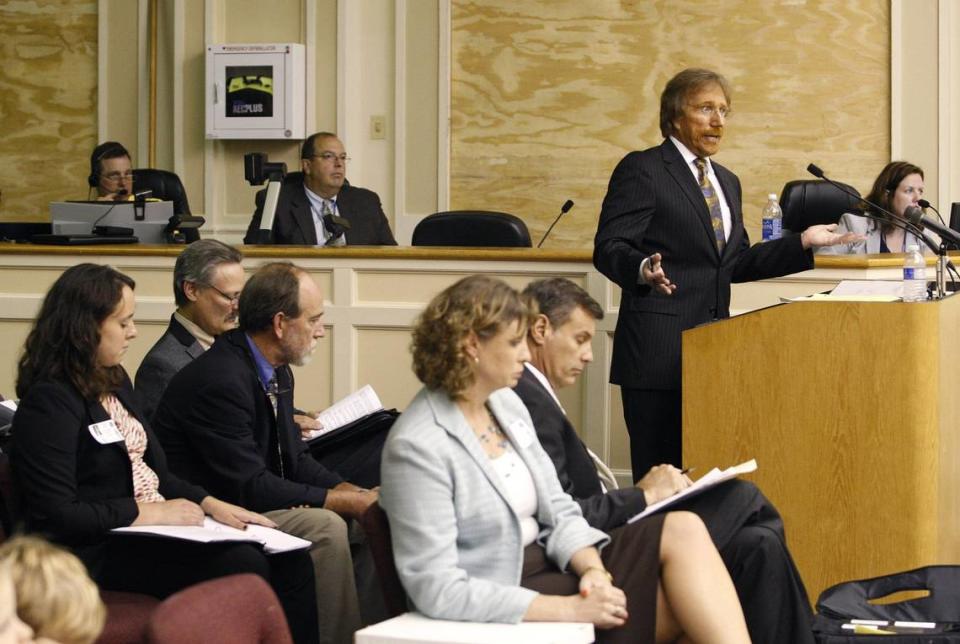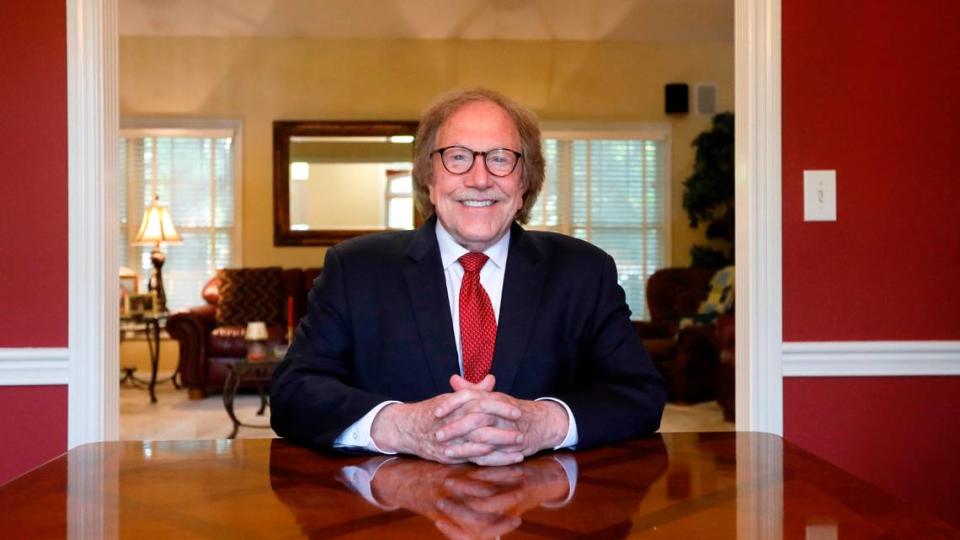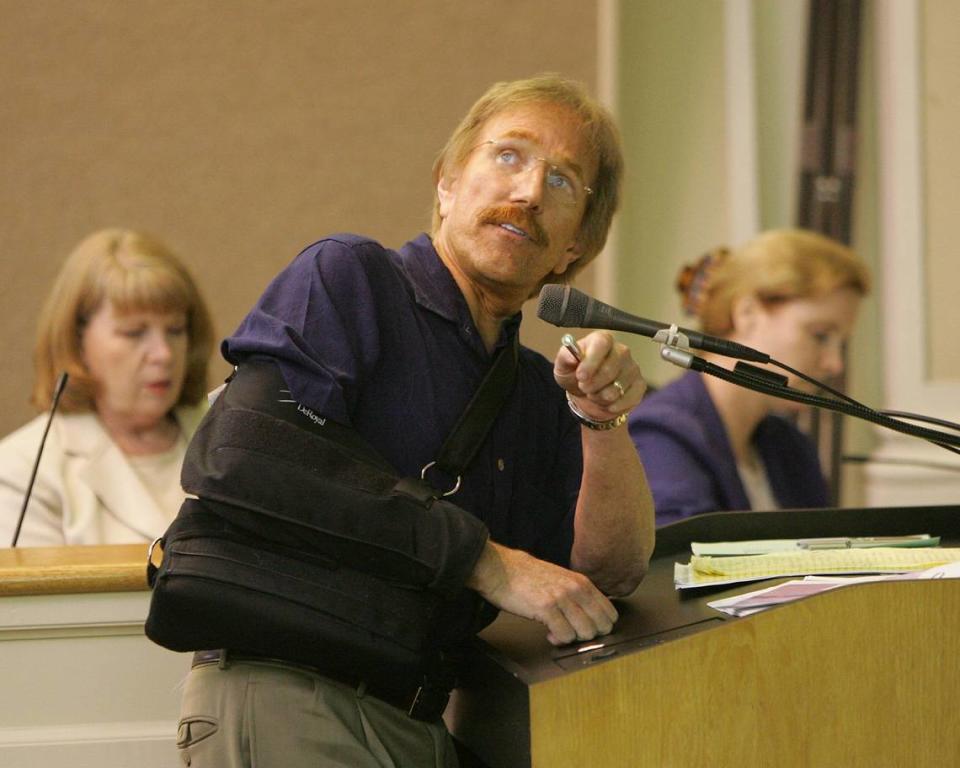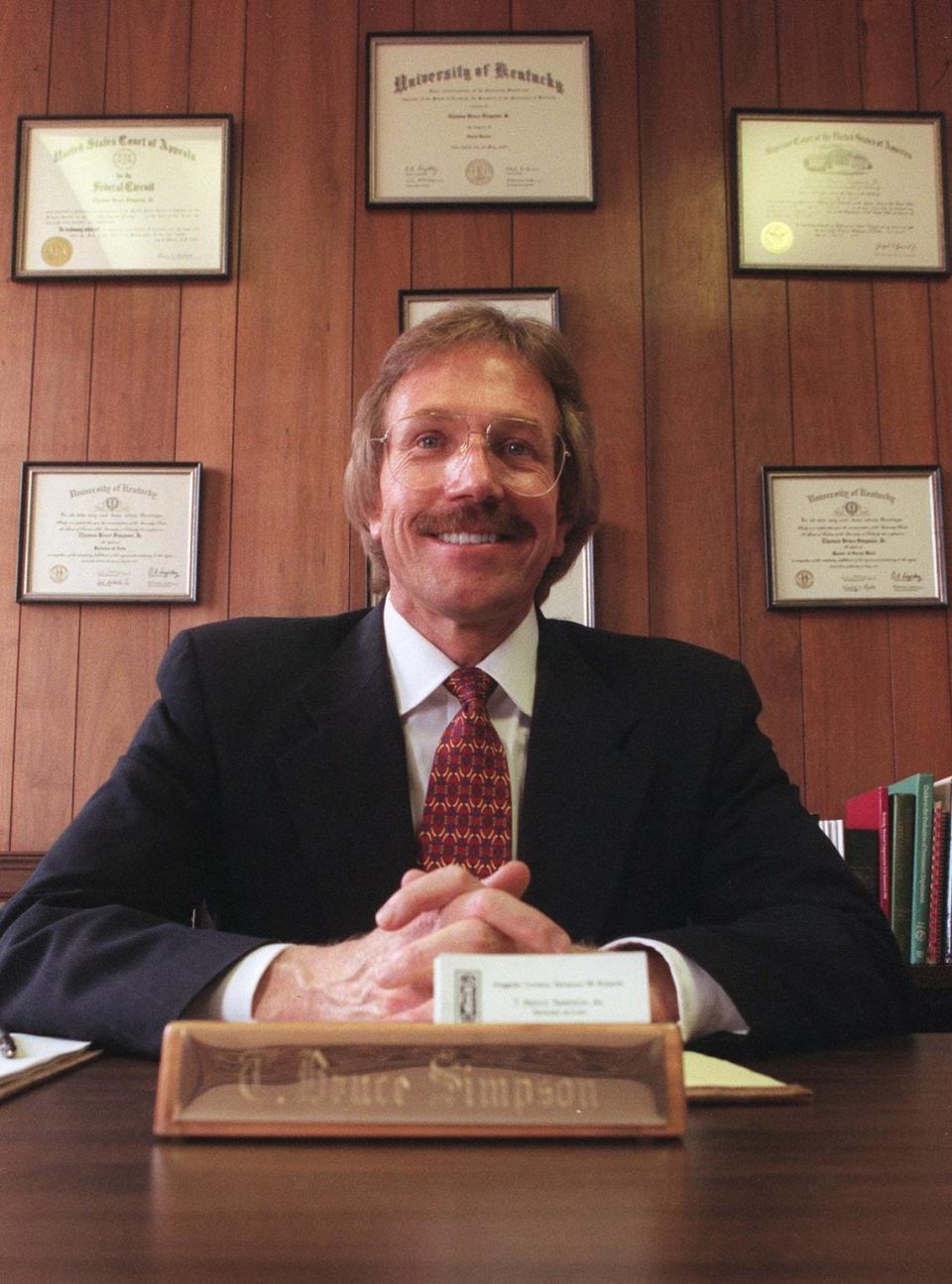‘You can be helped.’ Lexington lawyer’s attempt to kill himself now a quest to save lives
Editor’s note: This story is about suicide and describes sensitive details that could be triggering to some readers. The 988 Suicide and Crisis Lifeline is a hotline for individuals in crisis or for those looking to help someone else. To speak with a trained listener, call 988.
There’s a body in Maple Grove Cemetery, according to the caller.
The call came in to the Jessamine County 911 dispatch at around 6 p.m. Jan. 25.
Dispatch agreed to send a police officer to the Nicholasville cemetery.
The caller hung up before dispatch could get his name, according to an audio recording of the phone call obtained by the Herald-Leader through an Open Records Act request.
The caller was Bruce Simpson, a longtime Lexington attorney.
There wasn’t a body.
Not yet.
Simpson, 73, had come to Maple Grove Cemetery, where some members of his family were buried, to die. He had a handgun he had purchased less than 12 hours earlier. The people at the gun shop had assured him it was an effective weapon.
Simpson didn’t want to miss. He tested the weapon, shooting one bullet into the ground. The sound and the power of the gun stunned him. He then made the call to 911 so his body wouldn’t remain unclaimed and his family wouldn’t worry.
He put the gun to his head.
Click.
The gun had jammed.
Simpson was still alive.
He wasn’t relieved.
“I was still determined to do it,” Simpson said.
‘In less than 12 hours, I decided to kill myself’
How Simpson got to the cemetery and to a point in his life where he thought the only way out was through the grave, started with health problems. He also suffered from untreated depression. Then an adverse court ruling led him to a gun store.
In February 2022, he was treated for heart problems. In May, he fell and suffered a brain bleed. He was in and out of the hospital for months. Simpson recovered but now realizes there were signs his short-term memory was not what it once was.
“I’ve never needed a calendar,” Simpson said. A land use lawyer, Simpson practiced in front of planning commissions and courts throughout Central Kentucky. He typically could keep the myriad of court appearances and deadlines straight without jotting them down.
At least that’s what he thought.
The bad news that his health problems had impacted him more than he realized came via the U. S. Post office.
It was a letter from an appellate court. He had forgotten to file a legal brief in a case his clients had won at the trial level.
Simpson prided himself on being a great advocate. He represents homeowners and developers in land use cases — often contentious hearings that pit neighbor against neighbor.
He had his faults, but he knew he was a good lawyer.
But the paper in front of him said something different. He had screwed up.
He was gutted — no, gutted didn’t cover it, he said.
“In less than 12 hours, I’d decided to kill myself,” Simpson said. “I’d hurt a client. I’ve never done that in my life.”

‘We’ve got to get our heads out of the sand’
Simpson’s story is shocking to many who are familiar with the affable and seemingly unflappable lawyer, known for championing so many underdogs during his 40 year career.
It isn’t for Yvette Hourigan, director of the Kentucky Lawyer Assistance Program, which helps oversee suicide awareness and prevention efforts, through the Kentucky Supreme Court.
“Lawyers are six times more likely than the general population to die by suicide,” Hourigan said, pointing to one of dozens of studies that show high suicide rates in the legal profession.
Lawyers are professional verbal boxers. Their job involves constant conflict, and that constant adversarial stance creates stress. That stress can lead to depression, Hourigan said.
Depression alone or a combination of depression and substance use disorder can to lead to suicidal thoughts, Hourigan said.
Many lawyers also are organized, systematic, typical Type A personality types.
“But we can’t control a jury,” Hourigan said. “We can’t control the facts of a case.”
The lack of control can lead to self blame, like in Simpson’s case, she said.
But suicides are not unique to the legal industry. It has become a national public health crisis.
The Centers for Disease Control and Prevention now lists suicide as one of the leading causes of death in the United States. Suicides increased 36% between 2000 and 2021. Men are more likely to commit suicide than women. They made up roughly 80% of all suicide deaths in 2021 but only 50% of the population, CDC data shows.
Hourigan and the lawyer assistance program have ramped up efforts to address mental health and suicide in Kentucky over the past decade.
Over the span of less than four weeks in late December 2020 and early January 2021, four Kentucky lawyers died by suicide. The cluster of suicides further galvanized the Kentucky legal community to talk more about mental health, depression and suicide.
Hourigan, who has traveled across the country to speak to various groups on mental health and suicide prevention in the legal community, led more than 20 free seminars in the year following those suicides.
“You can’t just ask a lawyer if you they are feeling like they may harm themselves,” Hourigan said. “You have to ask them point blank: Have you contemplated taking your own life?”
The number of Kentucky lawyers who die by suicide is not known. Long-held stigmas about mental health and suicide still prevail.
“It’s under-reported,” Hourigan said.
Simpson knows lawyers who have died by suicide.
“It was never acknowledged,” Simpson said. “People just whisper about it.”
Lawyers are who other people turn to when they are in a jam — whether it be driving under the influence or a business dispute.
“We are supposed to take care of people,” Simpson said. Admitting they, too, struggle can be tricky for lawyers to admit, he said.
“As a lawyer, because you have this role as a warrior, it makes it a lot more difficult to reach out for help,” Simpson said.

That’s not helpful, Hourigan said.
“We’ve got to get our head out of the sand,” Hourigan said.
The Kentucky Lawyer Assistance Program is launching a new first-in-the-country program with the American Foundation for Suicide Prevention, a national nonprofit. It’s an online screening tool.
The program will be geared specifically toward lawyers. The launch is set for sometime before the end of the year.
Hourigan also speaks every year to Kentucky law students about mental health and depression. Making young lawyers or soon-to-be lawyers aware about the profession’s high suicide rate is a critical first step.
It’s also been rewarding.
“Young lawyers are much more open about their mental health, about talking about mental health, their own struggles with depression and seeking treatment,” Hourigan said.
“That’s why Bruce’s story is so important.”

‘He saved me four times’
After the gun failed to fire, Simpson, alone and cold in a cemetery more than 20 miles from home, was at a loss.
He had written a suicide note and left it at his Fayette County home for his wife to find. He didn’t want to take his own life in his own home and decided on Maple Grove Cemetery because he grew up in Jessamine County. He took an Uber to the cemetery.
“I didn’t want anyone to have to come get my car,” he said.
Nicholasville police showed up looking for the dead body Simpson reported.
Simpson put years of quick legal thinking to work. He was walking and thought he saw a dead body but it turned out to be just a garbage bag, he told police.
So sorry, officers.
The officers left and Simpson pondered his next steps.
“I was still going to do it,” he said.
He had no car. He walked out of the cemetery and stood on the road. He called Bruce Smith, a Jessamine County attorney and longtime friend. The two had not spoken in about five years due to a dust-up over some land use cases where the two had been on opposing sides.
Smith, however, was happy to hear from Simpson. The two made plans to meet, and Smith picked up Simpson to head to a local bar where they talked and mended their friendship.
Simpson did not tell his friend and sometimes legal adversary he was going to end his own life. He told Smith he had come to the cemetery “to meditate.” He also lied and told Smith he and and his wife had gotten into a fight.
After they left the bar, Smith drove him to a gas station across the street from the cemetery. Simpson told Smith he was going to call an Uber to take him back to Fayette County.
Simpson tried to get out of the car. He was still determined to go back to the cemetery to kill himself.
Smith, though, wouldn’t let him.
“Ubers don’t come to Nicholasville,” Smith said.
Simpson lied and told Smith he had the Uber driver’s phone number.
He tried to get out of the car again.
Smith said no. It was cold. He would wait with Simpson until the Uber arrived.
Simpson was out of plausible excuses.
Finally, Smith drove Simpson home.
Meanwhile, Simpson’s phone wouldn’t stop ringing. His wife had found his suicide note. Police and friends were frantically trying to find him. He ignored the constant beeps of his phone and eventually turned it off.
When Smith and Simpson arrived on the street of Simpson’s South Lexington home, there were police cars parked in front of his house.
Simpson lied again. He told Smith his wife must have called the police because of a fight they had prior to Simpson coming to Jessamine County.
Smith agreed to take Simpson a few blocks away from his house. By the the time Simpson walked home, the police would be gone, he told Smith.
After Smith left, Simpson took out his gun. He looked around. Near him was a large retention basin. As a land use lawyer, he had argued both for and against water retention basins many times. He couldn’t kill himself next to a retention basin. It would be too ironic.
“Then I thought, I can’t do this to Bruce,” Simpson said. Smith had no idea about Simpson’s plans. “He saved me four times that night.”
As Simpson started his walk back to his home, a peace came over him. He can’t really explain it. Thoughts of suicide and self harm had passed.
In a recent interview, Smith said he had no idea Simpson had planned to kill himself. He doesn’t know why he picked up the phone that January night.
“I don’t really like taking phone calls at night,” Smith said. “I saw it was Bruce and I decided to answer the phone.”
‘I’ve never been better’
When Simpson got home to his relieved wife and family, his wife called Lexington police, who had left his home but were still looking for Simpson.
He assured his wife and family he was fine. He was no longer a threat to himself or others.
Lexington police officers, who returned to his home, told Simpson that’s not how it works. They can’t just leave. He had to spend three days at Eastern State Hospital, the Lexington state mental institution that serves most of Central and Southern Kentucky.
Simpson complied but thought at the time he didn’t need to go.
“I am embarrassed to say how many times in my career I have made jokes about Eastern State Hospital,” Simpson said. “Yet, here I was.”
Those three days changed his life.
He spoke with a psychologist at Eastern State. It was during an initial assessment the doctor confirmed Simpson had short-term memory issues likely exacerbated by the stroke. There was good news: There’s medication to treat it, Simpson soon discovered.
His untreated depression also contributed to his memory problems, doctors said.
He struggled with low self-esteem most of his life. It wasn’t until he had success as a lawyer in his 40s that those thoughts of self-doubt slowly abated.
“If someone said, ‘Thank you, you did such a good job,‘ that was enough for me,” Simpson said.
He had repeated bouts of severe depression most of his life and didn’t know it, he learned.
He’s been in therapy. He’s now on medications to treat anxiety, depression and the short-term memory loss.
“I’ve never been better,” Simpson said. “I should have sought help 40 years ago.”

Others, including Smith, cautioned Simpson not to go public with his story. Many in the legal profession told Simpson if he talked about his problems, he would never be hired again.
Simpson disagreed.
That’s part of the problem — if no one talks about it, suicides will continue to be a public health problem, he said.
“I should be dead,” Simpson said. He survived heart problems and a brain bleed. But untreated depression nearly killed him. Mental illness is a deadly disease and people need to talk about it.
He has written opinion pieces about his experience for the Kentucky Bar Association and the American Bar Association. Both legal groups are expected to publish his first-person account later this year. He has also met with his clients connected to the legal case where the appellate brief was not filed. He has advised them of their rights and encouraged them to seek new legal counsel.
He has had multiple cases since Jan. 25. He loves his job. He loves representing clients. Thanks to the medications, he’s thinking more clearly than he has in decades, he said.
“I’ve been into the deepest abyss, the darkest place no human being should ever venture,” he said. “You do not need to go there. There is no need for you to go there. Whatever I can do to stop somebody, to give them pause, I want to do it because I am so grateful I am here today.”
“There is no need to kill yourself,” he said. “You can be helped. You can be helped.”
Lawyers seeking assistance can contact the Kentucky Lawyer Assistance Program at 502-226-9373 or at its website at www.kylap.org. All communications are confidential.
The 988 Suicide and Crisis Lifeline is a hotline for individuals in crisis or for those looking to help someone else. To speak with a trained listener, call 988.
Crisis Text Line is a texting service for emotional crisis support. To speak with a trained listener, text HELLO to 741741. It is free, available 24/7, and confidential.

